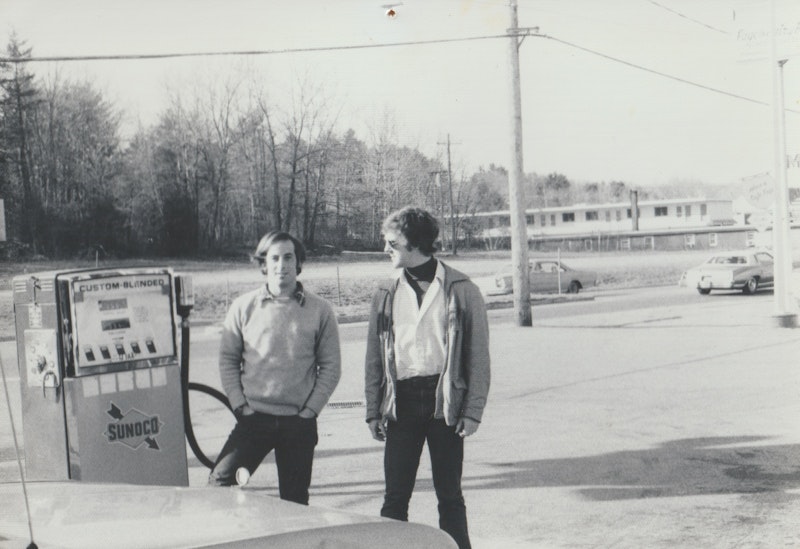As long as autos travel on the ground—and for the record, I fully believed George Jetson’s vision of the future in the early-1960s; all those promises of flying cars, bullet trains and advanced Concorde-like flights went for naught—(mostly) young Americans will thrill to the rite of passage (sort of an equivalent, for the affluent, of a Continental tour in the early-20th century) known as the Road Trip. I wasn’t sure, in my rehearsals for retirement, that such adventures were still popular, but was assured by my Millennial sons that the tradition remains strong. Praise the Lord, for there’s not much more fun than taking off for vague destinations, taking turns behind the wheel (I was almost always a passenger, except for a 1974 haul from Baltimore to Houston to deliver a car), driving buzzed, or merely caffeinated, and seeing where you end up.
In the picture above are two high school friends, Howie Nadjari (who also was a classmate at Johns Hopkins) and brainy, athletic and no-airs-about-him Mark Stilwell, who was a sophomore at Yale at this point. It wasn’t a total road trip: Howie and I took an Amtrak train to New Haven (where I also saw a stoner buddy Sam, a similarly smart fellow who’d been kicked out of four prep schools for petty indiscretions, but wound up at Yale, and unfortunately affected a Skull and Bones air, greeting me, “Russell! Good man! Let me show you my ‘humble abode!’” which was palatial compared to my basement apartment in Baltimore, which suited me at $32 a month), and then we headed north to Hanover, where Bobby Ringler was a pre-med at Dartmouth.
I’ve no idea where this photo in New England was taken (my son Nicky says that Howie and Mark look like Simon & Garfunkel in the snap), but it’s fairly representative of Nowheresville—filling the tank with gas that was pricey at the time—but my best guess is the location is somewhere outside Boston. It was tops getting together with, at that point, lifelong friends—you didn’t know it at the time, at least consciously, that it’d be years before seeing them again, if ever, as jobs and family ruled—and though we’d traveled different cultural paths (I wasn’t a Led Zeppelin fan, for example, but kept quiet when Mark earnestly harmonized with Robert Plant on “Stairway to Heaven,”) that all melted away, symbolized in New Haven when Mark took Howie and me to Pepe’s for the legitimately-praised pizza.
Dartmouth was a tough sell for me: very jock-oriented (although, like formerly all-male schools, began admitting women in 1972—my friend at JHU, Paula, joked that she was an affirmative action student, though white and affluent; Hopkins broke the glass ceiling in 1970, a real switch from my brother Doug’s freshman year there in 1965, when jackets and ties were required in the dining hall)—and somewhat hostile to guys with long hair, the most egregious lacrosse stick-cradling future MAGA nuts called hippies “fags,” which struck me as really dated. It was late-March but snow was still falling in New Hampshire, and I have to admit the students there (maybe spearheaded by the chicks) made ice sculptures, which were something to see as the sun set. In any case, Bobby was Bobby, the same funny and drop-your-jaw witty guy that I’d known since kindergarten and the four of us had a ball, even if Howie and I had to smoke joints on the sly (frowned upon at Dartmouth).
The four of us, after a quick over-the-border stop in Vermont to see Bernie Sanders (joshing!) and buy some maple syrup, made a two-hour stop at a tiny New Hampshire town—can’t remember the name and probably forgot it two weeks later back then—to see another Huntington friend, off for a semester and living with his exceedingly strange parents. (The father proudly called their black dog you-know-what, which was uncomfortable.) There was a haunted-house sense there, as our pal (who would “come out” to his folks a year later, which didn’t go over well) was burdened as the de facto “adult” of the homestead—the parents were older—charged with some cooking, cleaning and preventing familial civil war. It was creepy, and only got worse after Howie and I, on the pretense of looking at the snow-covered trees outside, smoked two quick bowls; we should’ve accepted the Budweiser tall boys that Mark and Bobby anesthetized themselves with.
Later, we went on a two-car (Bobby and Mark driving) trip back to New Haven, a hairy experience for me—even at 19, passing cigarettes from window-to-window at 80 mph on the highway was nuts—for which I was jokingly ridiculed, ribbing I appreciated far more once on the ground at Yale. You just know what random accident can occur, but happily all four of us are still marking rings around tree today.
Take a look at the clues to figure out what year it is: Michael Ovitz forms the Creative Artists Agency; Jeff Beck’s most successful album, Blow by Blow, is released; the unemployment rate peaks at nine percent in May; thoroughbred Ruffian is euthanized; Robert E. Lee receives a posthumous presidential pardon; a bomb at LaGuardia Airport kills 11; Zach Braff’s born and P.J. Wodehouse dies; Gary Snyder wins the Poetry Pulitzer Prize; and Linda Ronstadt’s “You’re No Good” is #51 on Billboard’s year-end chart.
—Follow Russ Smith on Twitter: @MUGGER2023

